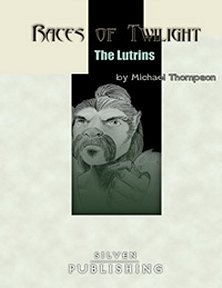
The lutrins are a race of marine-loving humanoids whose deity has deserted them, perhaps slain by the god of a horde of barbarians who where doing their best to overrun the lutrins. The loss of their god has shattered the lutrin people who even a thousand years later still struggle to cope with the loss of their patron deity.
Chapter 1 gives an overview of the lutrins, beginning with their mythology and the sad story of how their god Otravos was lost, the very deity which created their race in the first place. A very orderly people, they claimed to have learned everything from Otravos as they developed from a simple fishing society to a sophisticated merchantile empire while retaining respect for all living things. Not long after they were attacked by a bunch of barbarians who claimed that their god would trounce Otravos, the mountain above the lutrins' main city - where Otravos was said to live - exploded in a cataclysm of volcanic activity, and Otravos fell silent, never to be heard from again. The chapter goes on to describe the lutrins' physical appearance and the necessary details to roll up a lutrin character. Their racial history has left them confused, with a tendency towards distain towards any other group's laws as their own lawgiver is gone. Many lutrins exhibit what could almost be described as manic-depressive tendencies, being wildly extrovert and fun-loving one day and morose the next as they recall what their race has lost.
Chapter 2 examines Lutrin society, starting with an overview of their standard lifecycle. After a somewhat rebellious youth, during which Lutrin history and perhaps a trade are learned, virtually all young adults set off for a period of exploration and adventure. For some, this is but a brief fling and they soon return to settle down, while others take much longer to return if indeed they do so at all. All, at home or on the road, are liable to bouts of black depression although they are cheerful and outgoing, even wild, the rest of the time. Their townships are much like any other, save for the absence of any place of worship, and always based on and around water.
Chapter 3 looks at religion and gods. Deprived of their ancestral deity Otravos, most either lack faith or have turned to a new philosophy, that of entropy. They believe that the whole of creation is spiralling towards destruction and that nothing can be done save watch the growing chaos. It's a philosophy that enjoins its followers to enjoy the present, for tomorrow - or soon thereafter - they will all be dead.
Chapter 4 runs through the regular core character classes describing how each one fits (or does not fit) the Lutrin. It also includes a new core class, the entropist. Most classes are open to lutrins, although there are no clerics - unless the odd individual has chosen to follow a foreign deity - and rangers and druids tend to be interested in nature as expressed in oceans, rivers and lakes rather than in woodlands. Rogues and bards are popular choices, and sorcerers are more common than wizards. Entropists are given in full detail, and are able by virtue of immersing themselves in their philosophy to cast spells of a 'clerical' nature. Spells are gained through meditation rather than prayer, and none with a lawful descriptor can be cast. There are some impressive class abilities as well.
Chapter 5 describes a range of feats, some confined to lutrins and others available to any character who can qualify for them. Several are aquatic in nature - such as swimming feats, deep diver, an underwater version of blindsight and even pack mule of the seas - someone who can bear heavy loads whilst swimming.
Chapter 6 presents three prestige classes. First is the lutrin redeemer. These are amongst the few lutrins who do not believe that their god Otravos is dead, and instead teach that he will return if the lutrins can sort themselves out, prove themselves worthy. They stand for law, and often are hired as judges by other races. In complete contrast is the madcap, who are fearless and impulsive and, to be honest, a bit bored if they are not literally living life on the edge. The prestige class is open to any race, but is popular with lutrins especially those who are rogues or fighters. Finally there is the sea dog, accomplished sailors and explorers who are probably more at home in or on the water than they are on land.
To round the book off, Chapter 7 talks about equipment and magic items specific to the lutrin (although in the most part usable by anybody). This includes the cravak, a distinctive knife with an extremely curved blade which is the favoured weapon of many lutrins. There's also a rather fine blubber coat to keep you warm at sea in cold latitudes and the breathing shell, a magical SCUBA set which provides air for up to 5 hours.
Overall, this is a fascinating race which would provide for fascinating encounters... I'm already thinking about how to bring them into my current game!
Return to Races of Twilight: The Lutrin page.
Reviewed: 29 December 2005

